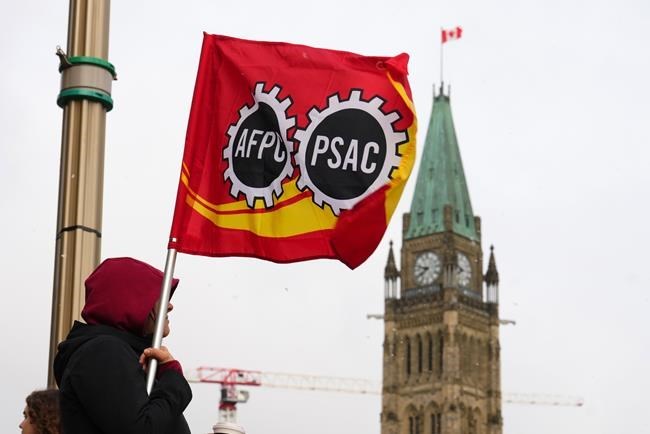OTTAWA — An ongoing strike of thousands of public servants is causing service disruptions across the country as both sides are facing different kinds of pressure to reach a deal.
Thursday marked the second day of job action by members of the Public Service Alliance of Canada, which comes at the height of tax season and is expected to cause slowdowns at the border, delays in processing immigration applications and limiting passport services.
In one of the largest strikes in Canada history, government workers walked off the job as of 12:01 a.m. EDT Wednesday, hitting the picket lines at some 250 locations across the country.
"When will this prime minister apologize for his incompetence and end this strike?" Conservative MP Stephanie Kusie, the transport critic, said during question period in the House of Commons.
Conservatives are holding the federal government responsible for service disruptions caused by the strike.
While services deemed essential will continue, some services such as passport applications will be significantly disrupted.
On Thursday, Social Development Minister Karina Gould was asked about potential backlogs the strike may cause.
"The good news is we're in a much better position this year than we were last year," Gould said, noting the federal government has more capacity than it did after the pandemic to tackle backlogs.
Few new details regarding negotiations came to light on Thursday as bargaining continued between the union and the federal government.
"We're back at the bargaining table today, continuing to work hard to get a deal that is fair to employees and reasonable for taxpayers — as quickly as possible," Treasury Board President Mona Fortier tweeted on Thursday.
The Liberals are trying to avert prolonged service disruptions that could draw the ire of Canadians tired of post-pandemic delays.
Their minority government is also being carried through key votes in the House of Commons by the NDP. That party will refuse to support any back-to-work legislation for striking workers and also secured a promise from the Liberals to introduce anti-scab legislation during lockouts or strikes in federally regulated industries by the end of this year.
With an uncertain economic outlook threatening federal finances, the Liberal government is facing difficult spending decisions.
Its 2023 federal budget made hefty investments in the clean economy, but at the same time, promised a three per cent reduction in spending on the public service by 2026-27.
Finance Minister Chrystia Freeland said Thursday that she thinks the goal is achievable, even with the ongoing labour negotiations.
"It is important for the government to be thoughtful on our spending on ourselves," Freeland said in a news conference in Pickering, Ont.
On the other end of the dispute, PSAC says it will strike for as long as it takes, but a limited strike fund suggests that may be difficult to do.
According to its most recent available financial statements, the union had about $43 million at the end of 2021.
The union is offering $75-per-day in base strike pay to workers who show up to the picket line.
While that fund could cover days of striking, the math suggests the union would find itself challenged to maintain the strike for a prolonged period of time.
The bargaining groups involve some 155,000 federal public servants, including 35,000 Canada Revenue Agency staffers and about 46,000 essential workers who are not part of the strike action.
The Treasury Board says the majority of full-time federal workers in four bargaining units, which make up 120,000 employees, earn between $50,000 and $75,000. About three per cent earn less than $50,000.
The union is asking for a 13.5 per cent raise over the next three years, saying the increases are necessary to keep pace with inflation and the cost of living.
The Treasury Board and the CRA both say they have offered the union a nine per cent raise over three years, on the recommendation of the third-party Public Interest Commission.
Hundreds of workers headed to the picket line at Parliament Hill on Thursday morning armed with signs, megaphones and their dogs.
Public servant Paul Jones arrived at the Hill in an inflatable costume that made it look like he was riding a black-and-pink bird.
He said that while the atmosphere seems playful with music blasting and people dancing and talking with other union members, the strike is serious and it is happening out of necessity.
This is not just for fun, he said.
"We want to go back to work," said Jones.
"We're suffering and I hope they go back to the table with a genuine offer."
Jones said that while public servants are making more than minimum wage, they are not making enough to sustain their expenses during a time of high inflation.
PSAC's national president, Chris Aylward, told reporters Wednesday that members are willing to strike for "as long as it takes."
"Workers are fed up, workers are frustrated and workers are saying, 'Enough is enough. We're not going to take the garbage anymore.'"
This report by The Canadian Press was first published April 20, 2023.
Nojoud Al Mallees and Cindy Tran, The Canadian Press
Note to readers: This is a corrected story. A previous version said the strike would pause new employment insurance applications.




